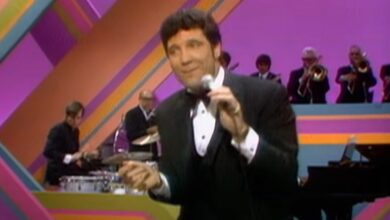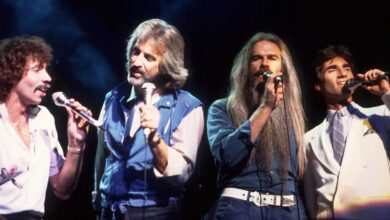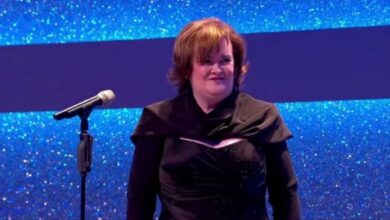Bobby Vinton’s ‘Roses Are Red (My Love)’ Captures Hearts and Climbs Charts in 1962, Defining an Era of Romantic Ballads”
In 1962, Bobby Vinton released “Roses Are Red (My Love),” a song that would not only dominate the charts but also establish him as one of the most recognizable voices in romantic pop music. With its tender lyrics and Vinton’s heartfelt delivery, the track resonated deeply with audiences. The song’s delicate orchestration and sentimental tone set it apart in a rapidly evolving music landscape, securing its spot at number one on the Billboard Hot 100. For weeks, it remained a favorite on radio stations, becoming a defining soundtrack of early 1960s romance.
Bobby Vinton’s path to stardom was anything but ordinary. Born in Canonsburg, Pennsylvania, in 1935, he was the son of a bandleader, growing up surrounded by music. His early career saw him pursuing both music and a degree in musical composition at Duquesne University. Unlike many of his contemporaries, Vinton had a deep understanding of musical theory, which later influenced his distinct sound. Though he initially tried his hand as a bandleader, his career pivoted when he signed a recording contract with Epic Records, launching him into the spotlight.
“Roses Are Red (My Love)” was brought to Vinton’s attention during a pivotal moment in his career. Written by Paul Evans and Al Byron, the song told a classic story of enduring yet bittersweet love. Vinton, who had recently struggled to find chart success, recognized the emotional potential of the track. The simplicity of its lyrics — comparing romantic affection to the timeless imagery of red roses and violets — struck a universal chord. He poured his own sense of longing into the performance, imbuing the song with sincerity that listeners found irresistible.
The recording process for “Roses Are Red (My Love)” was equally noteworthy. Under the guidance of producer Bob Morgan, Vinton’s vocals were placed at the forefront, backed by a lush arrangement of strings and subtle orchestral flourishes. The choice to keep the production minimal allowed Vinton’s emotive voice to shine. Unlike the booming rock and roll hits of the era, this ballad leaned into vulnerability. The song’s deliberate pacing and tender phrasing created an atmosphere of intimacy, capturing the essence of heartfelt confession.
When it was released, the response was immediate and enthusiastic. “Roses Are Red (My Love)” shot to the top of the Billboard Hot 100, becoming Vinton’s first number-one hit. It also achieved notable success on the Adult Contemporary chart, further solidifying Vinton’s crossover appeal. Critics praised his vocal warmth and the song’s universal theme of lost love. Beyond the United States, it found popularity in numerous international markets, contributing to the growing appeal of American pop ballads worldwide.
The cultural impact of the song was equally profound. Arriving at a time when rock and roll was dominating the charts, “Roses Are Red (My Love)” reminded listeners of the timeless allure of romantic balladry. It bridged generational divides, appealing to both young listeners and older audiences who preferred the sentimental crooning of the previous decade. Vinton’s sincere approach to storytelling through music distinguished him in an industry increasingly characterized by high-energy performances and rebellious themes.
Following the success of the song, Bobby Vinton’s career experienced a meteoric rise. He became a staple on television programs and variety shows, further endearing himself to the public. The ballad’s triumph also led to the release of a string of similarly themed romantic hits, including “Blue Velvet” and “Mr. Lonely.” Vinton’s persona as the quintessential “Polish Prince” of romantic pop made him a household name, particularly among fans who cherished the tender ballads of the early 1960s.
The influence of “Roses Are Red (My Love)” extended beyond Vinton’s own career. The song’s orchestral arrangement and narrative-driven style inspired numerous artists to embrace a more emotive and sentimental form of pop music. Other crooners of the era, such as Andy Williams and Paul Anka, drew upon similar themes in their own ballads. Additionally, the track’s commercial success proved that heartfelt storytelling still had a place in a rapidly modernizing music scene.
Over the years, the song has been covered and reinterpreted by various artists. While Vinton’s version remains the definitive recording, performers across genres have paid homage to its emotional core. From soulful renditions to stripped-down acoustic interpretations, the song’s simplicity and emotional resonance have allowed it to transcend stylistic boundaries.
For Bobby Vinton, the release of “Roses Are Red (My Love)” marked the beginning of a decades-long career filled with chart-topping successes and dedicated fans. Despite the changing tides of the music industry, he maintained his reputation as one of the most beloved balladeers of his time. The song’s enduring popularity brought him countless accolades, and it remains a centerpiece of his musical legacy.
Today, “Roses Are Red (My Love)” is often heard on oldies radio stations and remains a favorite for nostalgic listeners. Its gentle orchestration and heartfelt lyrics continue to evoke memories of first loves and romantic gestures. It has also been featured in film and television, further cementing its status as a cultural touchstone.
Ultimately, “Roses Are Red (My Love)” stands as a testament to the power of simplicity in songwriting. Through Bobby Vinton’s genuine delivery and the song’s timeless message, it captured the hearts of millions. Six decades after its release, it remains a poignant reminder of love’s enduring beauty, ensuring its place in the pantheon of classic American ballads.



